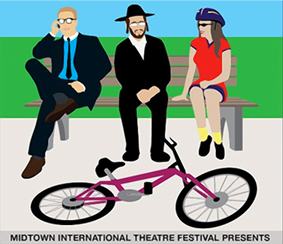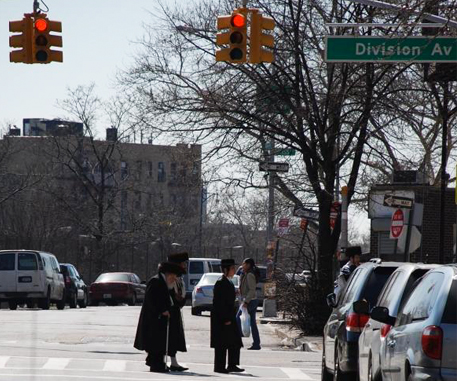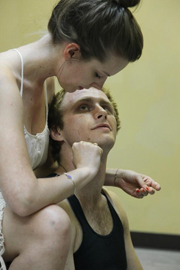© 2013 The Texas Lawbook.
By Patricia Baldwin
Lifestyle Writer for The Texas Lawbook

Bone says the culmination of seven weeks of preparation for opening night in New York feels “phenomenal.” She adds, “I am excited and relieved. I am a tired, but happy, camper.”
“Division Avenue” is Bone’s fourth play to be produced – the first outside Texas. She hopes the festival exposure will result in the play’s “breakout” – being picked up for an additional run by another New York or regional theatre company – and her securing a literary agent.
Of course, Bone’s script involves a lawyer, a legal dispute and more. The plot, in part, is about a Brooklyn neighborhood controversy the New York Daily News characterized as the “Hasid-hipster bike war.”

The play focuses on the family tensions that result when the character Efraim, a 28-year-old Hasidic Jew in Brooklyn’s Williamsburg section, considers leaving his neighborhood and faith. The subplot focuses on his father’s involvement in a lawsuit against bicycle activists.
Bone muses she always seems to be writing about attorneys.
The comedy’s storyline, however, is not because Bone is married to Fish & Richardson principal Tom Melsheimer, although he does deserve credit for her finding her inspiration. He suggested, during a 2009 vacation, that the family take what turned out to be a fateful walking tour of Brooklyn’s Williamsburg neighborhood.
Bone remembers sensing “an uneasy dynamic” as she viewed life in the once-insular Hasidic community, which was being infiltrated by modern society and secular gentrification. She took a photo that captured the changing and clashing cultures. The snapshot showed a pair of Orthodox Jews crossing one way on Division Avenue (the street sign in the upper right of the photo) while a woman in tight jeans crossed the other way.

Bone could not shake the memory, and she later painted the photo’s image for a visual arts class. And the self-described “liberal Catholic girl with three kids from Dallas” began to research a very different world. She learned that many young Hasidic Jews were leaving their roots and struggling to adapt to the society beyond their traditional faith and family values.
She also discovered Williamsburg neighborhood tensions over the proposed “Citi Bike,” a bike-sharing program that planned to install dozens of bicycle rental kiosks throughout Williamsburg, Brooklyn Heights and Clinton Hill.
This May, as the program was launched, a compromise was reached to carve out a no-bike zone in the bike-averse, Hasidic section of South Williamsburg. At that time, residents told the New York Daily News they were “pleased.”

Since the MITF accepted Bone’s play for its current season, the project has become a family affair, Melsheimer says. With two teenage sons home for the summer, Melsheimer has “held down the fort” in Dallas. Their 13-year-old daughter accompanied her mother to New York. “It’s been a real education for her,” Melsheimer adds.
He explains that the inspirational Brooklyn tour was rather serendipitous. The family had been to New York many times and already had seen most of the typical tourist attractions. He suggested Brooklyn because “many tourists never leave Manhattan.”
Bone says that she “found a term” she thinks describes the Williamsburg neighborhood. “It is ‘living in peaceful parallelism,’ not harmony.”
OK, here’s a spoiler alert. Does “Division Avenue” have a happy ending?
Bone allows, “It has a peaceful ending.”
Do you have a special avocation, hobby or other lifestyle interest to share? Please email patricia.baldwin@texaslawbook.net.
© 2013 The Texas Lawbook. Content of The Texas Lawbook is controlled and protected by specific licensing agreements with our subscribers and under federal copyright laws. Any distribution of this content without the consent of The Texas Lawbook is prohibited.
If you see any inaccuracy in any article in The Texas Lawbook, please contact us. Our goal is content that is 100% true and accurate. Thank you.
